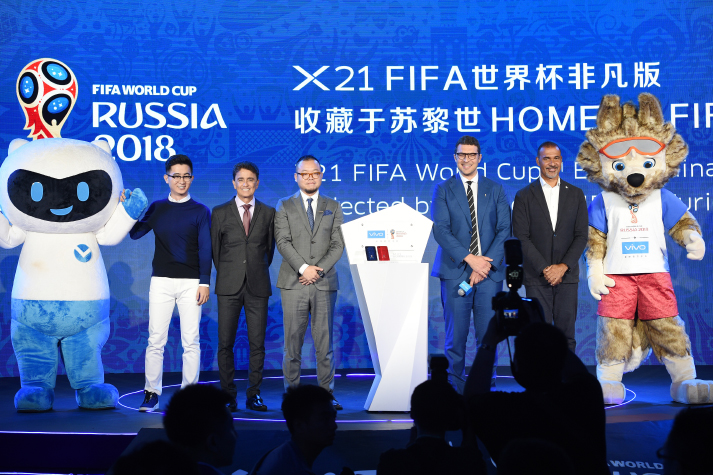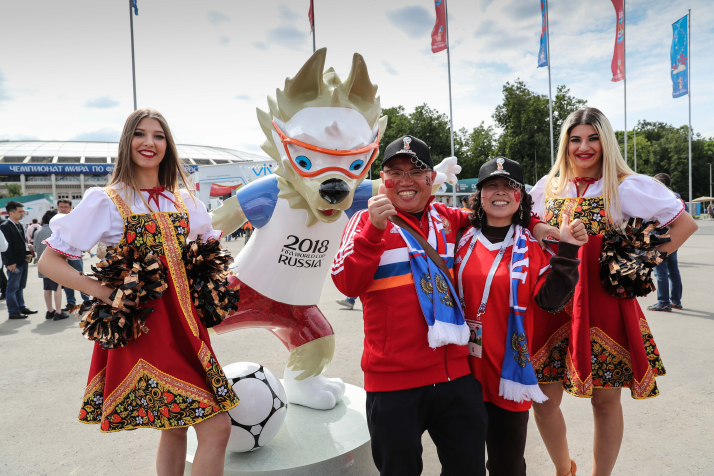| Business |
| Financial Fair Play | |
| China equalizes World Cup absence with financial contribution to the planet's biggest football event | |
|
|
 Chinese smartphone maker VIVO launches a special World Cup edition of its flagship X21 model in Beijing on May 22 (XINHUA)
"Except for the national football team, almost every other Chinese has gone to the 2018 FIFA World Cup." Bai Yansong, a well-known anchor on state broadcaster China Central Television (CCTV), may have been joking when he uttered these now famous words, but he was nonetheless accurate in his description of China's role at the world's biggest celebration of football. Based on open figures and statistics from its members, the Association of Chartered Certified Accountants (ACCA) recently calculated an account for the 2018 FIFA World Cup in Russia. "Although the Chinese national team failed to qualify for the tournament in Russia, this year's World Cup is still full of Chinese factors. We estimate that 70,000-100,000 Chinese tourists will be in Russia for the games, and that Chinese fans will contribute nearly $1 billion in tourism revenue for the host country," said Yuki Qian, ACCA's Head of Policy for China, in an interview with Nanfang Metropolis Daily.  A football fan couple from east China's Jiangxi Province pose for a photo with the World Cup mascot in Moscow (XINHUA)
Joining the game According to FIFA statistics, Chinese fans have bought more than 40,000 tickets for games at the World Cup in Russia, the ninth highest worldwide. Zabivaka the Wolf, the official mascot of the 2018 FIFA World Cup, is produced by Kayford, a Hangzhou-based company in east China's Zhejiang Province, which also has the rights to produce and sell around 100 official products for the event, including plush toys, cups, key rings and jerseys. Besides the mascot, the official ball used at this year's World Cup, the Adidas Telstar 18, was also made in Dongguan, south China's Guangdong Province. Commemorative coins for the tournament were made by the Nanjing Mint which has a century-long history. Moreover, about 2,000 square meters of LED displays for the World Cup were produced by Unilumin Group Co. Ltd., a Chinese company listed on the Shenzhen Stock Exchange. Wen Hao, an analyst with Tianfeng Securities Co. Ltd., said the two major sources of income for the sports industry are broadcasting and sponsorship deals. According to a report by China Economic Weekly, it is estimated that CCTV spends $300-400 million for the exclusive rights to broadcast in China for the 2018 and 2022 World Cups. The program covers all media rights across every platform including live, delayed and highlight coverage. As mobile devices become increasingly widespread, more Chinese fans are using their smartphones to watch World Cup matches, attracting more attention to the distribution of copyright to mobile terminals. On May 29, Youku, a video-streaming platform owned by Chinese e-commerce giant Alibaba Group, revealed that it had entered into a partnership with CCTV, acquiring the digital streaming rights to the 2018 World Cup. Youku is the second online platform to win rights from CCTV to livestream the month-long tournament, and will share them with Migu, a video-streaming company under mobile carrier China Mobile. The big players According to ACCA figures, the prize money for the 2018 FIFA World Cup will be $400 million, up 12 percent on the 2014 event in Brazil. In April, the Russian Government announced that its 2018 World Cup costs had grown to $11.8 billion, 7.2 percent higher than the $11 billion cost of the 2014 World Cup and 97 percent higher than the $6-billion World Cup in South Africa in 2010. As the prize fund and operational costs of the World Cup rise, revenue from Chinese sponsors will provide considerable financial support to FIFA. As a FIFA Partner (the topmost level of FIFA's sponsorship program), Chinese real estate and leisure group Wanda has reportedly signed an agreement worth $80 million each year. As a FIFA World Cup Sponsor (the second level of FIFA's sponsorship program), VIVO, a Chinese smartphone maker, has reportedly agreed with FIFA to provide 65 million euros ($75.2 million) each year until the 2022 World Cup. The other two 2018 FIFA World Cup Sponsors from China include consumer electronics manufacturer Hisense and dairy producer Mengniu, but the exact amounts of their deals have not been disclosed. Three Chinese firms are also on the list of FIFA World Cup Regional Sponsors (the third level of FIFA's sponsorship program), namely, electric motorcycle producer Yadea, men's business attire brand Diking and technology and entertainment experience company LUCI. Together, these seven Chinese sponsors are estimated to provide around $400 million in sponsorship revenue based on their categories' minimum contribution. The sale of televisions for watching the World Cup may be an important reason behind Hisense's heavy spending on sponsorship deals. According to figures available, against the backdrop of sluggish television sales in China in recent years, Hisense realized sales revenue of 7.81 billion yuan ($1.22 billion) in the first quarter this year, a year-on-year increase of 16.54 percent, gaining 18.65 percent of the market share in China and ranking first across the industry. An anonymous Hisense employee told Nanfang Metropolis Daily that being a sponsor of the World Cup is "to the company's profit." During the 2016 UEFA Championships League for which Hisense was also a sponsor, the company's recognition in the global market increased by 6 percentage points, and its sales volume in the European market during the second quarter of 2016 soared by 65 percent. The effect of its sports marketing continued after the competition ended: in 2017, Hisense earned $3.9 billion from the international market, up by 22.3 percent year on year, with double-digit growth in Europe, South Africa, Oceania, North America and Japan. Sports marketing is also a major strategy for Mengniu. Zhang Yong, Mengniu's Vice President of Strategic Management, said the group will spend 2 billion yuan ($311.53 million) in marketing during this year's World Cup, including the FIFA sponsorship, advertisement input and Lionel Messi's endorsement deal. A report by Guotai Junan Securities Co. Ltd. said sponsorship at the 2018 FIFA World Cup is expected to bring huge business exposure to Mengniu, and as their World Cup marketing campaign advances, the group will gain more sales revenue this year. Copyedited by Laurence Coulton Comments to wangjun@bjreview.com |
|
||||||||||||||||||||||||||||
|